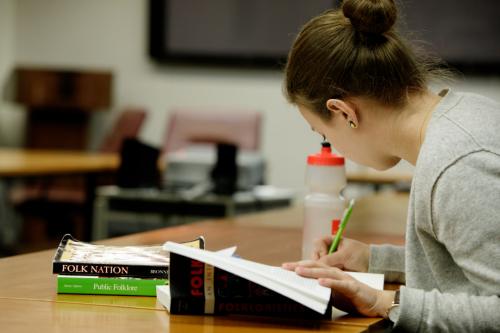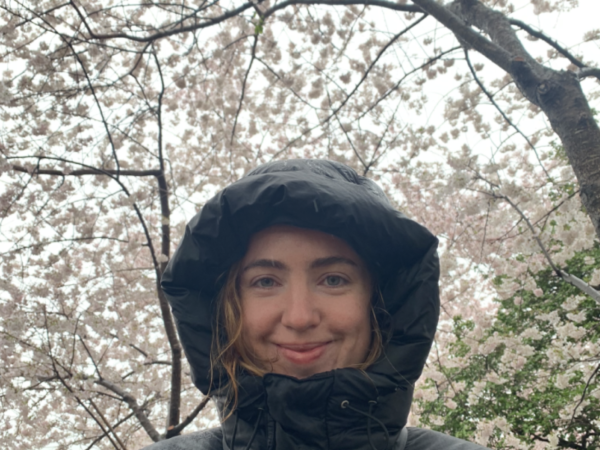Funding & Awards
American Studies students frequently earn recognition and funding to support their research endeavors. This recognition includes an undergraduate essay prize, undergraduate honors and funding for graduate student research travel around the globe.
The Elsie M. Carper Prize for Outstanding Senior Research Essay
The Carper Prize is awarded annually to a graduating American Studies major who has exhibited extraordinary research and writing abilities. The prize goes to the best research paper in the senior research seminar. Funding for the award comes from the Carper Endowment, which was amassed through a series of gifts from alumna Elsie M. Carper (BA ’41) and other individuals.
- History
Pioneering reporter and editor Elsie M. Carper (BA ’41) worked at the Washington Post for 48 years, displaying an unwavering commitment to improving media coverage and journalism employment opportunities for African Americans and women. When she became the Post’s first female assistant managing editor, she used her position to hire a more diverse pool of journalists.
Carper received many prestigious awards for her work on issues like teaching reading and segregation in schools. In 1990 she received a GW Distinguished Alumni Achievement Award, and in 1993, she was inducted into the Society of Professional Journalists Hall of Fame. Carper gave generously to the Department of American Studies until her death in 2007. Her support helped fund two major initiatives to support student research: the Elsie M. Carper Prize, and the Elsie M. Carpenter Undergraduate Scholarship Fund.
- Carper Prize Winners
2024-25: Celeste Elsbury, "Crafting the Clubwoman, Conserving the Youth: Identity Construction and Civic Activism in the GFWC Clubwoman Magazine, 1944-1952" and Terra Pilch-Bisson, "Self-Determination and Stewardship: Lessons for radical environmental justice organizing from Washington, D.C.’s anti-freeway fight"
2023-24: Alys Gross, "Possibility Space: Situating the History of Corcoran College and its Merger with George Washington University Within the Context of Neoliberalism and Examining its Future Potential"
2022-23: Lauren Guzowski, "I Lost, but I Gained: D.C. Abortion Clinics, Self-Help Feminism, and Making Space" and Julia Russo, "A Legacy of Disenfranchisement: Interrogating the Displacement of the Historical Black Foggy Bottom Community"
2021-22: Oliver Kogod, "After the Gold Rush: Forging Jewish Identity in San Francisco after 1848" and Andrea Martinez, "Rapid Stasis: Familiarity in Public Print Advertising to Manufacture Dismissal"
2020-21: Grace Bautista: ‘National Feelings’ of the Philippinesian: Early Twentieth Century Filipino Community Life at The George Washington University and Hannah Delvecchio: "A Life Dedicated to the Sea and One Another: Women in Nineteenth-Century New England Maritime History"
2019-20: Michael Knapp: "The Trachtenberg Era: George Washington University’s National Ascension From a Local Perspective" and Maya Adelstein: "Internships: A consequential phenomenon at The George Washington University"
2018-19: Lexi Chavin: "Race and Place: The Impact of GWU on the Evolution of Foggy Bottom" and Isabelle Moody: "Examining GW's Student-Led Food Initiatives Through Food Sovereignty"
2017–18: Samantha Gonzalez: “The Sum of the Whole: The Negro Units of the Federal Theatre Project”
2016–17: Ciaran Lithgow, “Constructing the Conservative Vision: Housing Policy in the Cold War”
2015–16: Ariel Amaru, “From Legal to Social Authority: Black Women’s Reporting of Domestic Violence”
2014–15: Altaire DeLeon, “On Negotiating Latino Vernacular Housescapes: The Spatial Performance of Mexican/Mexican-American Citizenship in East Los Angeles”
2013–14: Rachel Holbreich, “First Do Harm”
"Thanks to the support of the Kasch Foundation, I visited 10 different archival collections [that] allowed me to start my dissertation."
Kimberly Probolus
MA ’17, PhD Student
2020-21: Grace Bautista: ‘National Feelings’ of the Philippinesian: Early Twentieth Century Filipino Community Life at The George Washington University and Hannah Delvecchio: "A Life Dedicated to the Sea and One Another: Women in Nineteenth-Century New England Maritime History"
2019-20: Michael Knapp: "The Trachtenberg Era: George Washington University’s National Ascension From a Local Perspective" and Maya Adelstein: "Internships: A consequential phenomenon at The George Washington University"
2018-19: Lexi Chavin: "Race and Place: The Impact of GWU on the Evolution of Foggy Bottom" and Isabelle Moody: "Examining GW's Student-Led Food Initiatives Through Food Sovereignty"
2017–18: Samantha Gonzalez: “The Sum of the Whole: The Negro Units of the Federal Theatre Project”
2016–17: Ciaran Lithgow, “Constructing the Conservative Vision: Housing Policy in the Cold War”
2015–16: Ariel Amaru, “From Legal to Social Authority: Black Women’s Reporting of Domestic Violence”
2014–15: Altaire DeLeon, “On Negotiating Latino Vernacular Housescapes: The Spatial Performance of Mexican/Mexican-American Citizenship in East Los Angeles”
2013–14: Rachel Holbreich, “First Do Harm”
The Horton-Vlach Fund
The Horton-Vlach Fund supplements a broad range of scholarship, from faculty and student research to public events and educational enrichment activities. The fund was launched in 2014 to honor two former professors in American Studies, James Horton and John Vlach, for their extraordinary research and teaching legacies.
- History
James Oliver Horton was the Benjamin Banneker Professor of American Studies and History at GW and Historian Emeritus of the Smithsonian Institution’s National Museum of American History. He taught the “tough stuff” of American history with a quick wit and deep historical knowledge, introducing classes to invisibility issues being raised by black feminists, masculinity challenges for enslaved and newly freed black men and class overlaps and tensions among working-class men and women.
Horton’s graduate teaching produced a generation of museum staff and curators attuned to making African American history central to the history of the country. He acted as historical expert for then-First Lady Hillary Clinton, and he held international influence as a visiting lecturer and professor in parts of Europe and Asia. In 2006 Horton was elected to the National Academy of Arts and Sciences. That same year, he received the George Washington University President’s Medal for scholarly achievement and teaching excellence. He died in 2017.
John Vlach was a professor in the Department of American Studies for thirty-two years. With special expertise in folklife and folk art, African American folklife, and vernacular architecture, he authored ten books and served as a guest curator or consultant to numerous museums, including the New Orleans Museum of Art and the Henry Gallery in Seattle. Shortly after his retirement, in 2013, the Vernacular Architecture Forum awarded him its Henry Glassie Award for lifetime scholarly achievement in vernacular architecture studies. Vlach passed away in 2022.
At the request of American Studies alumna Libby Ellsworth-Kasch (BA ’08), the Jeffrey C. Kasch Foundation pledged a generous donation to the department to support student research. The foundation’s five-year pledge of annual donations will go toward the Horton-Vlach Fund, to support graduate and undergraduate students who have travel or other expenses related to their original research projects.
- Horton-Vlach Fund Awardees
Many of our awardees have used their Horton-Vlach funding to conduct research around the globe.
*Denotes current students- Craig Lanier Allen
- Colin Anderson
- Sara Awartani
- Vyta Baselice
- Jacklin Bolduan
- Ashley Brown
- Cam Cannon*
- Jasmine Cannon
- Julie Chamberlain
- Thomas Dolan
- Brady Forrest
- Liz Foshe*
- Molly Henderson*
- Michael Horka
- Maddie House-Tuck*
- Aryn Kelly*
- Scott Larson
- Harry Lewis
- Joe LoyaconoBustos
- Pat Nugent
- Kimberly Pendleton
- Kim Probolus
- Zaynab Quadri
- George Ramirez
- Rahima Schwenkbeck
- GJ Sevillano*
- Samantha Silver*
- How to Apply
Thanks to the generous support of our alumni and donors, the GWU Department of American Studies supports undergraduate research and other innovative projects. If you are doing a project that requires research support, or if you would like to participate in a summer program or other intensive experience that would be related to your course work in American Studies, please apply for the AmSt Undergraduate Research and Training program.
This fund supports a wide variety of educational, research, and training experiences. These might include, but are not limited to:
- Funds for travel to do research for the senior thesis or other major projects
- Funds to support participation in summer intensive programs, such as language or other skills
- Funds to present papers at academic conferences
The American Studies department does not provide funds for ordinary summer courses, internships, or summer living expenses. AmSt Undergrad RSF grants range from $250 to $1500.
Provide a one-page statement of your project, which includes what you will do, when it will occur, and how it will support your research and learning goals as an American studies major. Also provide a brief budget, and ask a faculty member to submit a short letter of support.
Applications for Undergraduate Research/Scholarly Funding should be emailed to the Director of Undergraduate Studies (Libby Anker) and copied to the amst
 gwu [dot] edu email. Deadlines will be announced via email.
gwu [dot] edu email. Deadlines will be announced via email.
Horton-Vlach Research Trip Spotlight
Thanks to a generous donation from the Jeffrey Kasch Foundation that was contributed to the Horton-Vlach Fund, many of our doctoral students have conducted breakthrough research around the globe.
GJ Sevillano
PhD candidate GJ Sevillano used their funding to digitize cookbooks, recipes, and other important ephemera. The funds also allowed Sevillano to develop a presentation for the Association for Asian American Studies Conference based on a chapter of their dissertation.
Maddie House-Tuck
PhD candidate Maddie House-Tuck used her funding to visit archives at the Milwaukee County Historical Society, Milwaukee Public Library, University of Wisconsin at Milwaukee, and more.
Aryn Kelly
PhD candidate Aryn Kelly visited the New York Public Library for the Performing Arts’ collection of ephemera relating to the 1939 production of The Hot Mikado.








